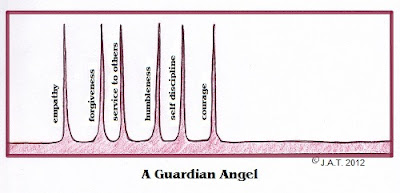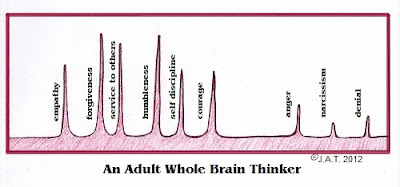A: In January 2005, you dropped a bombshell on me. That’s when you responded to my persistent questions about human evil by explaining the Christ Zone model to me. I think this would be a good time and place for us to talk about this scientific model and what it can mean for human beings who are trying to heal their hearts and minds and bodies.

WWI memorial at St. Mathew’s United Church, Halifax, Nova Scotia. Photo credit JAT 2017.
J: Sure thing.
A: I want to make certain that readers understand this model is an original model, an original philosophical and scientific model, that arose directly out of my channelling work with you. It’s not a rehash of ancient teachings. It’s not a cut-and-paste job from the writings of mystics, new or old. There’s no attempt in this model to give an answer for every world problem. The model has limits, because it’s just a model, NOT a “Complete Handbook That Will Solve All the World’s Problems.” But it’s a very useful model, and I’d like to make sure that credit is given where credit is due.
J: You sound a bit hot under the collar there.
A: Last time you were expressing your exasperation that people won’t take responsibility for what they put inside their own brains. Today I’m expressing my exasperation at some of the reactions I’ve had from certain Christians about my work as a channeller and mystic. Some people seem to believe that if I actually am talking to you, Jesus, then I ought to be able to get solutions from you for every problem afflicting the world today. Like the cure for cancer. And all I can do is shake my head and repeat what I’ve said before: I’m just one person. I have a human brain. I have limits, like everyone else. I’m not even trying to get all the answers. I’m just trying to understand a few things really well.
J: I think the recent inundation of books and films and TV shows about the almost “limitless” potential of the “evolving human mind” has created a lot of unrealistic expectations. Those who’ve never had an experience of faith or deep connection with God can end up having some very peculiar ideas about what these experiences feel like.
A: I’ve never been skydiving or deep sea diving, so I don’t think it’s right for me to have an opinion about what it feels like to be an actual skydiver or deep sea diver. Yet many Christians I’ve spoken with believe it’s okay for them to have an opinion about what it feels like for me to be a mystic-channeller. They feel they “know” what’s going on inside my head — what my intent is, what my methods are — without ever actually asking me. I don’t like being pigeon-holed like this. I don’t like being told I’m making grandiose claims when I spend a lot of my time making very ordinary, un-grandiose claims (such as the claim that everyone is born with their own powerful intuitive circuitry, circuitry that obeys the same “use it or lose it” imperative as any other part of the human brain).
Anyway . . . now that I’ve had my little rant . . . back to the topic at hand. The Christ Zone. Let’s talk about the Christ Zone.
J: The Christ Zone model is a simplified schematic that helps provide a framework for understanding the complex interaction between the soul and the biological body. Each person who is incarnated in 3D form on Planet Earth (in other words, everybody in the world!) is a marvel of divine engineering. The engineering part is seen in the diverse functions of human biology, from RNA and DNA all the way through stem cells and reproductive functions to, well, life. Life in human form. Consciousness living in temporary form in a 3D body. Soul-and-body temporarily intertwined. Fully intertwined. Not easily intertwined, nor permanently intertwined. But fully intertwined, fully integrated in a holistic way, if all goes well in childhood and adolescence.
A: Which all too often doesn’t happen.
J: Yes. This is the painful reality. Far, far too many children are raised by their families and communities in ways that make it impossible for young people to grow up to become mature, loving human beings.
A: How do you define “mature”?
J: Ah. Thank you for that leading question. I define a mature human being as one who is able to balance in a reasonably consistent way the competing demands of both the Darwinian Circuitry of the brain and the Soul Circuitry of the brain.
You know that diagram you created in WordPerfect of the Christ Zone?
A: The one that would make a PhotoShop artist shudder?
J: Yes. Let’s post that right now so people can see what we’re talking about.
A: Okay. If you think so. (Now our readers will know for sure that I practice what I preach about not living for status points, ’cause this diagram ain’t no brilliant artistic production, that’s for sure!)
Okay. Here it is. Sigh . . .

Maslow’s Hierarchy of Needs – NOT the Christ Zone Model
J: It’s not that bad. It gets the point across. The main point in the first diagram you’ve posted here is that this triangle is not the Christ Zone diagram. This triangle is Abraham Maslow’s Hierarchy of Needs. Maslow, a humanist psychologist who had a positive view of human beings and their true potential, proposed this “triangular” model to explain what he perceived as an overall pattern of human behaviour. He noticed that everyone tries to meet the physiological needs that form the base layer of the triangle — needs such as food, oxygen, water, protection from the elements — but only a few people seem able to arrive at the pinnacle of the triangle — the human experience of connection and completion and purpose and transcendence he labelled “self-actualization.”
A: His theories have met with some success, though Maslow couldn’t come up with a rigorous method of testing for self-actualization. He had to rely a lot on self-reporting of these rare human experiences.
J: Yes. These experiences are considered sporadic and hard to quantify by most researchers.
A: Just as mystical experiences of unio mystica are considered sporadic and hard to quantify.
J: Yes. But the peak experiences described by Maslow and others aren’t the same internal experience as unio mystica. They aren’t synonymous. In fact, peak experiences are almost the opposite of mystical experiences of “oneness” with the Divine.
A: In what way?
J: During peak experiences — experiences of self-actualization — the sense of self isn’t lost or dissolved. If anything the sense of self is heightened. Accompanying this heightened sense of self is (paradoxically) a vast awareness of your own humbleness. Not humility (as religious thinkers have defined humility). Just . . . pure humbleness. A sense that you’re very, very important in the universe, and at the same time not important. That is, not more important than anyone else. During a state of self-actualization, you lose all interest in status, chosenness, pessimism, and self-pity. You just really feel connected. Connected to everyone and everything in Creation. But without losing your sense of self. You’re able to handle the truth that it’s okay with the universe for you to be you. You no longer have to hate yourself for being “different.” You’re able to like yourself, perhaps for the first time in your human life. Once you’ve nailed this truth, you can stop worrying about all your so-called “deficiencies” and “imperfections” and get on with the business of living — living with integrity, joy, trust, and courage.
A: You stop sweating the small stuff?
J: Mmmmmmm, well, no, it’s more like you can start focusing on the small stuff that matters.
A: Like eating nutritious food with your family at the dinner table each evening. Talking together, sharing events of the day, working out problems. Spending time together as a family.
J: Yeah, like that. See, eating dinner is an important part of meeting your physiological needs — the essential needs Maslow placed at the foot of the triangle because of their importance to human survival. But meeting your daily nutritional needs isn’t the only thing that’s happening at the dinner table. Hopefully, anyway. If you’re eating dinner at a table with people you love and trust, and who love and trust you, then you’re also meeting your needs for safety and belonging & love.
A: That’s too simple. Too logical.
J: And, if you live in a family where people believe it’s important to lift you up every day instead of slamming you down and constantly criticizing you for your mistakes and imperfections, then the dinner table conversation will probably also help you meet your need for self-esteem.
A: So you can find most of Maslow’s Hierarchy of Needs at the family dinner table?
J: If it’s a family where individuals are emotionally and spiritually mature, yes. The important point is that the family dinner table isn’t a ladder. It isn’t a vertical ladder of ascent. You don’t meet these diverse needs one at a time by first sitting silently at the table while you eat your fats, carbs, and proteins, then sitting in a self-restrained state to show your trust, then reaching out to give and receive affection and emotional support, then taking turns saying one thing out loud to dole out self-esteem the way you might dole out vitamin pills. The family dinner table is messy. It’s complicated. If you’re all healthy and happy and sane, you’re giving and receiving all these needs at the same time. Without a script. You just do it because it feels right. It’s spontaneous, it’s a bit chaotic at times, but it’s also kind and polite and respectful. Like real life.
A: I hate to say it, but the strict, orderly sequence you’ve just described — first you do this, then you do this, and God forbid you should do them all at the same time! — this sequence sounds a lotttttttttt like the Christian worship services I’ve attended.
J: Christian worship does a very poor job of modelling the Christ Zone for anyone. Living in the Christ Zone means you have to balance all your main needs simultaneously, not sequentially. You have to balance your biological needs (physiological and safety needs) with your soul’s emotional needs (belonging & love, plus self-esteem). You have to respect both. You can’t place your body’s biological needs above your soul’s needs; neither can you ignore your body’s legitimate needs as you strive to meet your soul’s needs. God expects you to look after both. At the same time. Throughout your whole life. Until you die.
After you die, your full consciousness returns to its soul state, but even after you return Home to live as an angel-in-angel form, you’ll still have a soul body to look after. So there’s no getting out of the truth that mature, responsible, loving angels have to look after themselves. It’s a way to show God the Mother and God the Father how grateful you are to be you.
A: Here’s the diagram I made in WordPerfect of the actual Christ Zone model:

The Christ Zone Model (non-hierarchical)
It’s pretty self-explanatory. If you want to feel peak experiences, self-actualization, connection to God, or true faith (all pretty much synonymous with each other) you have to live a life of balance.
J: Yup. If you want to enter the Kingdom of God as I taught it, this diagram is the basic road map.
A: No wonder the Church doesn’t like you.
Addendum August 24, 2017:
I’m including a few links to articles that can help you get started on learning more about the brain and how the brain actually works (as opposed to way most of us assume the brain works). The closest parallel to the Christ Zone model is the theory of mind called Dual Process Theory. I hope that eventually researchers will see the link between Dual Process Theory and Big Five Personality Theory. In the meantime, the links posted here may help you open your mind to, well, the wonders of your own biological brain. God bless.
“Will religion ever disappear?” by Rachel Nuwer
“The Creativity of Dual Process ‘System 1’ Thinking” by Scott Barry Kaufman and Jerome L. Singer
“The Differences Between Happiness and Meaning in Life” by Scott Barry Kaufman
“Openness to Experience: The Gates to the Mind” by Luke Smillie
“Teaching the Children: Sharp Ideological Differences, Some Common Ground” by Pew Research Center
Posted in
brain's Darwinian Circuitry,
brain's Soul Circuitry,
brain-soul connection,
building your intuition,
chosenness,
Christ Zone,
humbleness,
mysticism,
Peace Sequence,
personal responsibility,
Realspiritik,
Whole Brain Thinking and tagged
brain-soul connection |
 This post is the final essay in the Blonde Mystic series. I hope you’ve enjoyed reading it as much as I’ve enjoyed writing it.
This post is the final essay in the Blonde Mystic series. I hope you’ve enjoyed reading it as much as I’ve enjoyed writing it.































